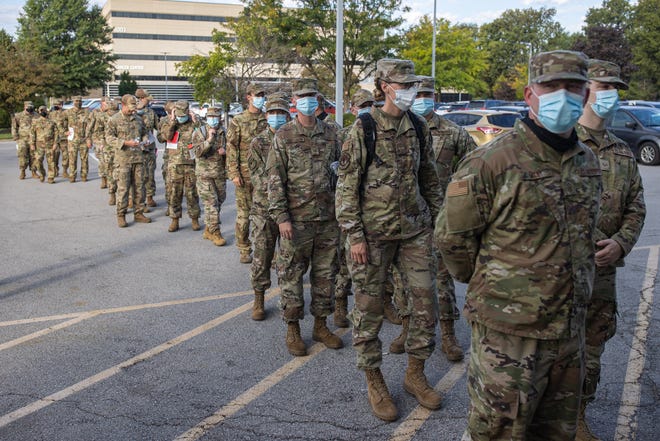

Kentucky hospitals remain overwhelmed by COVID-19 as they face chronic staff shortages and a growing financial drain from the increased costs of caring for so many critically ill patients, a hospital spokeswoman told a legislative committee Wednesday.
"Kentucky's facing an unprecedented surge in COVID-19 cases in hospitals due to the delta variant," said Nancy Galvagni, president of the Kentucky Hospital Association. "It's actually well exceeded the worst numbers we've had in the pandemic."
COVID-19 patients tend to be younger, sicker and nearly all unvaccinated, and are taking an increasing amount of intensive care space, according to testimony before the joint House-Senate Health, Welfare and Family Services Committee.
In the last three weeks, Kentucky hospitals have added 200 additional intensive care beds yet still have few to spare, Galvagni said.
"The beds are being filled as fast as we can create them," she said.
Meanwhile, the disease is taking a growing toll on hospital staff who are tending to critically ill patients, most of whom could have avoided severe illness, said Dr. Irfan Budhani, a pulmonologist from Crestview Hills.
"With this latest delta spike, our patients have been younger and much sicker," Budhani said. "We have younger, productive Kentuckians who are now dying of a disease that is completely preventable by wearing a mask and getting the vaccine."
The strain is affecting already understaffed hospitals, he said.
You may like:Kentucky doctor, researcher hail prospect of COVID-19 vaccine for kids under 12
"We've been at this for 18 months and counting," he said. "People are getting burned out."
Kentucky's 96 hospitals lost about $1 billion last year from increased COVID-19 costs, even after receiving additional federal assistance, and continue to lose money this year, Galvagni said.
"Hospitals, large and small hospitals, are all saying that they need help," Galvagni said.
Galvagni said the hospital association had appealed to legislators and the administration of Gov. Andy Beshear for more federal funds to be allocated for hospitals to recruit and retain staff during the recent legislative session on COVID-19 measures.
But lawmakers didn't provide the relief they said was outside the parameters of the special session called by Beshear. A last-minute effort to add $81 million for hospitals and other health facilities from the federal American Rescue Plan Act, or ARPA, failed on the last day of the three-day session.
Galvagni pointed to Arkansas as one of a number of states that used ARPA funds for hospitals to recruit and retain health workers. Arkansas allocated $245 million for that effort.
"We would love to have as much as Arkansas but we appreciate whatever the legislature can do to assist us," Galvagni said.
Lawmakers on the panel sympathized but said they can't allocate funds unless they are called back into a special legislative session by Beshear.
Sen. Ralph Alvarado, R-Winchester, who sponsored the failed measure to allocate $81 million to hospitals and other facilities, such as nursing homes, called directly on Beshear to act.
"Governor, if you're watching," Alvarado said, "I'm asking you to call us into special session to handle this issue ... please call us in and allow us to use ARPA funds to fix this problem."
You may like:Top US health official warns 'flat-earthers' holding nation back on COVID-19 vaccine rates
But Beshear thus far has shown no inclination to call another special session, saying current federal funds already have been allocated and he has yet to see a plan from legislative leaders.
Meanwhile, despite a slight plateau in new cases of COVID-19 in recent days, numbers of those hospitalized with the virus remain high and are causing an immense strain, Budhani, the northern Kentucky physician, said.
"The numbers are still very high," he said. "Resources are extremely stretched thin."
He described the plight of one COVID-19 patient he recently treated, a 38-year-old man who was unvaccinated. Doctors thought he should be transferred to another hospital for a treatment known as ECMO, which adds oxygen to the blood of patients in severe respiratory distress.
But there were no beds available in Kentucky or in any out-of-state hospital they contacted, Budhani said. The patient survived but Budhani said other patients might not fare so well.
"That's the degree of desperation you face with these critically ill, young patients you're trying to save with resources getting thin," he said.
Some patients can't believe they became so ill, he said.
"We see the desperation in our patients' faces when we are about to put them on a breathing machine," Budhani said. "They say they are ready to take the vaccine now but it's too late."
Reach Deborah Yetter at [email protected] or 502-582-4228. Find her on Twitter at @d_yetter. Support strong local journalism by subscribing today: www.courier-journal.com/subscribe.







